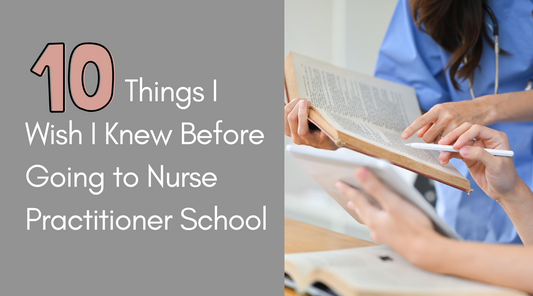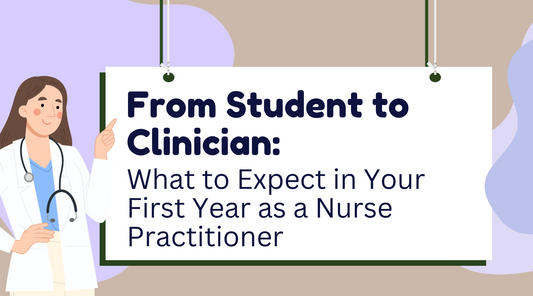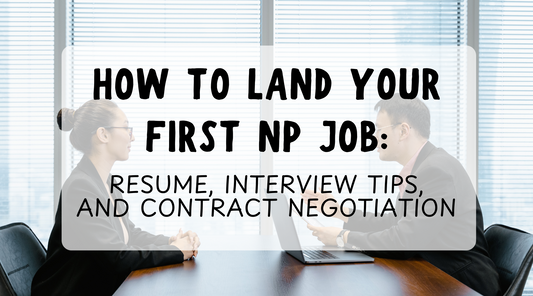I still remember the mix of excitement and anxiety I felt when I passed my board exam and officially became a Nurse Practitioner. After years of rigorous schooling, clinical rotations, and countless sleepless nights, I had finally reached my goal. But as I quickly learned, the transition from NP student to a practicing clinician is a whole new challenge. The first year is full of growth, self-doubt, and a steep learning curve, but with the right mindset and preparation, it can also be incredibly rewarding.
The Reality of the Transition
As an NP student, you are always under supervision. There is a preceptor guiding your decisions, reviewing your assessments, and stepping in when necessary. But once you step into your first job as an NP, that safety net disappears. Suddenly, you are expected to diagnose, prescribe, and manage patients independently. It’s both liberating and terrifying.
I remember my first patient as a licensed NP—a middle-aged woman with uncontrolled diabetes and hypertension. I was nervous as I typed my note, double- and triple-checking everything before submitting my prescription orders. I had studied these conditions extensively, but the weight of being the sole provider responsible for her care felt immense. That feeling of responsibility never truly goes away, but over time, you gain confidence in your decision-making and learn to trust yourself.
Credentialing and Licensure: The Waiting Game
One of the biggest surprises for me was how long it took to actually start working after passing my boards. The credentialing process is slow, often taking months before you’re officially able to see patients. Here’s what you need to do to get through this stage efficiently:
Apply for state licensure – Each state has different requirements, so check with your Board of Nursing to ensure you have all necessary documents.
Obtain your DEA license – If you will be prescribing controlled substances, you’ll need this. Some employers will cover the cost, so ask before paying out of pocket.
Get an NPI number – This is required for billing purposes and is free to obtain through CMS.
Complete employer credentialing – Once hired, your employer will need to credential you with insurance companies, which can take up to 90 days.
I made the mistake of assuming I could start working immediately after passing my boards, only to realize that I had weeks of paperwork ahead.
Job Hunting: Finding the Right Fit
Finding your first NP job can be overwhelming. There are so many factors to consider—salary, work environment, patient population, and work-life balance. During my job search, I applied to multiple positions, interviewed at various clinics and hospitals, and asked countless questions. Here’s what I learned:
Consider mentorship – Look for a job where senior providers are willing to guide you. A supportive team makes all the difference in your first year.
Negotiate your contract – Don’t be afraid to ask about salary, CME allowances, and PTO. You’ve worked hard for this position, and you deserve fair compensation.
Think about work-life balance – Some jobs have unrealistic patient loads for a new NP. Make sure you have enough time to properly assess and treat each patient.
I ultimately chose a job where I had a long orientation and a supervising physician available for questions. That support was crucial in my early days when I needed reassurance that I was making the right clinical decisions.
Building Confidence as a New NP
Confidence doesn’t come overnight. I spent the first few months second-guessing myself, rechecking guidelines, and feeling imposter syndrome creeping in. Here are some things that helped me build confidence:
Lean on your resources – UpToDate, clinical guidelines, and textbooks became my best friends. I wasn’t afraid to double-check things before making decisions.
Ask for help – No one expects you to know everything. I reached out to colleagues, pharmacists, and specialists whenever I had doubts.
Celebrate small wins – The first time a patient thanked me for making a difference in their care, I felt a surge of confidence that reminded me why I chose this profession.
One of my most memorable early experiences was treating a patient with a severe asthma exacerbation. I hesitated for a moment before confidently ordering nebulizer treatments, steroids, and adjusting her medication regimen. A week later, she returned for follow-up and told me she felt the best she had in months. That moment solidified that I was truly making a difference.
The Emotional Toll and Self-Care
Your first year as an NP is emotionally draining. There are days when you will feel overwhelmed, and that’s okay. You’ll make mistakes, and that’s okay too—as long as you learn from them.
For me, self-care became non-negotiable. I made sure to:
Set boundaries – I refused to take work home with me. Once I left the clinic, I focused on family, friends, and hobbies.
Find a support system – Talking to other NPs who had been through the same struggles reassured me that my experiences were normal.
Give myself grace – It’s easy to be hard on yourself, but remember, growth takes time. Every experienced NP was once a new grad.
The transition from NP student to practicing clinician is challenging but also incredibly rewarding. Your first year will test your knowledge, confidence, and emotional resilience. But with patience, persistence, and the right support system, you will grow into the provider you were meant to be.
Looking back, I can say that the struggles were worth it. I am now more confident, more skilled, and more sure of my abilities than I ever was when I started. So to all the new grad NPs out there—take a deep breath, trust yourself, and embrace the journey ahead.
You’ve got this.




